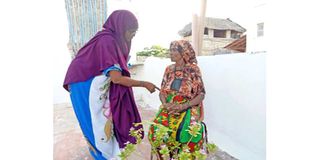Boni Forest women in family planning agony

Boni Forest women Khadija Gurba and Fatma Shizo. Women in the region endure long-term methods of family planning.
What you need to know:
- For years, nearly all health facilities have remained closed because of insecurity caused by al-Shabaab militants.
- Only Kiangwe and Kiunga dispensaries are in operation but lack adequate staff and drugs. Neither do they offer family planning services.
- Despite family planning calls, men, however, complain that their population is small and many births are needed, say family planning not a priority.
Women in terror-prone and remote areas of Lamu County grapple with inconveniencing, long-term methods of family planning owing to the unavailability of services in their villages.
They particularly use implants and intrauterine contraceptive devices to prevent unwanted pregnancies. Some have even resorted to permanent methods such as bilateral tubal ligation to avoid the stress of travelling long distances for regular services.
The worst-hit areas are Boni Forest’s Basuba, Milimani, Mangai, Mararani, Kiangwe, Sankuri, Bodhei, Pandanguo, Jima and Taksile, as well as the Lamu-Somalia border villages of Madina, Kiwayu, Mkokoni, Kiunga, Ishakani, Ras Kiamboni, and Sarira.
For years, most health facilities have remained closed because of insecurity caused by al-Shabaab militants. Health workers fled for fear of attacks. Only Kiangwe and Kiunga dispensaries are in operation but lack adequate staff and drugs. Neither do they offer family planning services.

Boni Forest women spokeswoman Khadija Gurba (centre) and community elders. Lack of health facilities and services has subjected women in remote villages of Lamu County to long-term methods of family planning.
Travelling agony
Nation.Africa observed that a woman in need of family planning services has to travel to King Fahad County Hospital, which is miles away. Such a journey costs at least Sh3,000.
In Mangai, Boni Forest, women's spokesperson Khadija Gurba tells Nation.Africa many of them avoid the cost implications, opting for long-term methods.
“If you investigate, you’ll find that all the women willing to plan their families use the long-term method of contraceptive. It’s not because we love it, but rather an effort to curb the frequent costs of travelling to where services are. We can’t use depos as that means spending dearly to travel all the way to Lamu town every three months,” says Ms Gurba.
“Some women experience negative side effects when they use methods like implants, but what can we do? We have no option. The health facilities available don’t offer family planning services.”
God's grace
Maryam Abatika, a Basuba local, says most of them don’t even plan their families as they are too poor to afford the services.
Ms Abatika, a mother of seven, says she lives by the grace of God and cannot use family planning methods since she doesn’t even know much about them.
“My neighbours have been coercing me into using family planning. They want me to do the implant for five years. But I don’t see its importance. My husband hasn’t complained,” she says.
Fatma Musa, a resident of Milimani, appeals to the county government to introduce programs that would see community health volunteers and nurses move around the villages to provide the services. She says many women in Boni Forest should be educated on family planning if they have to adopt the practice.
“Very few women here know about family planning; they also can't try it because we don’t have the facilities to provide them. Our appeal as remote village women, is for the county health department to introduce door-to-door services,” Ms Musa observes.

Fatma Shizo, the sought-after traditional birth attendant has helped rescue the lives of thousands of women and babies in the terror-prone Boni Forest in Lamu County.
Population concern
Some of the men we speak to say the issue has never been a problem as they use “natural methods”.
Doza Diza, an elder, says their population is still small, hence their women should give birth to many children.
“We don’t want the Bonis to remain a minority tribe. We need to multiply and move out of that bracket. Family planning has never been our priority as a community,” says Mr Diza.
A similar view is shared by Aden Suleiman, a Mararani resident, who expresses concern that long-term family planning methods might reduce “our already small number”.
“If the government wants us to plan our families, let them provide us with short-term methods such as the depo, so that any time we are ready to have more children, we can do it immediately. The five-year duration is too long,” says Mr Suleiman.
A recent report by the Lamu Health Department showed that the county’s uptake of family planning services is at 49 per cent. Health Executive Anne Gathoni, blamed several factors, including socio-cultural beliefs, myths and religious teachings, for undermining family planning.
Ms Gathoni, however, urged residents to plan their families to comfortably meet their needs. She appealed to men to be at the forefront of spearheading such efforts.
“Uptake is still low because many men here have turned a deaf ear to family planning and left it to their wives. Men still think it’s only women who should use family planning methods. I advise them to stand with their wives in advocating family planning. It’s for the benefit of all of us,” said Ms Gathoni.





